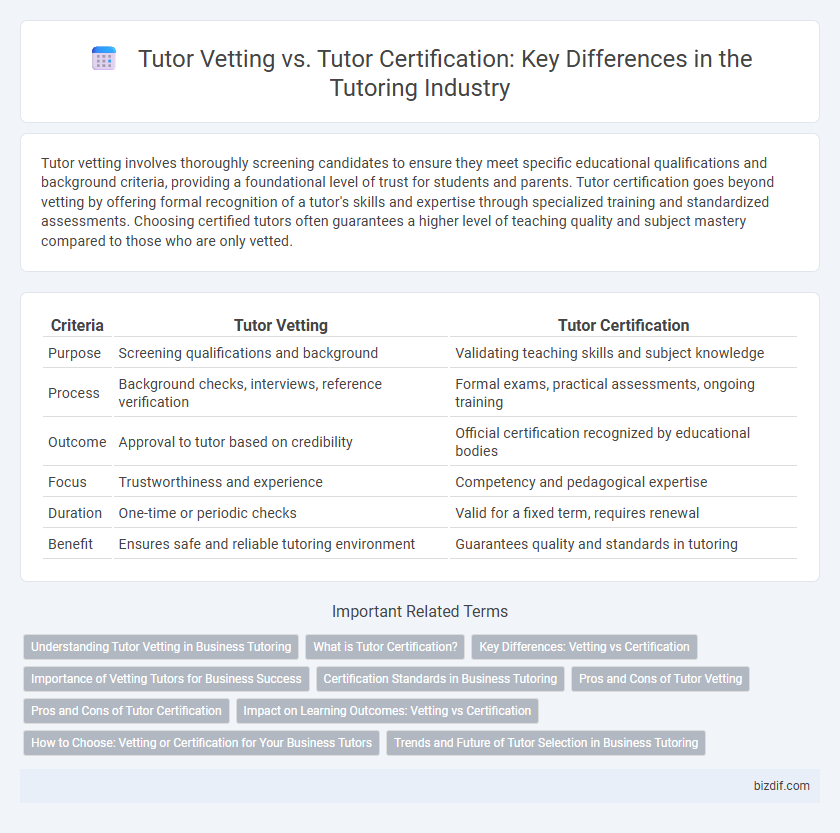Tutor vetting involves thoroughly screening candidates to ensure they meet specific educational qualifications and background criteria, providing a foundational level of trust for students and parents. Tutor certification goes beyond vetting by offering formal recognition of a tutor's skills and expertise through specialized training and standardized assessments. Choosing certified tutors often guarantees a higher level of teaching quality and subject mastery compared to those who are only vetted.
Table of Comparison
| Criteria | Tutor Vetting | Tutor Certification |
|---|---|---|
| Purpose | Screening qualifications and background | Validating teaching skills and subject knowledge |
| Process | Background checks, interviews, reference verification | Formal exams, practical assessments, ongoing training |
| Outcome | Approval to tutor based on credibility | Official certification recognized by educational bodies |
| Focus | Trustworthiness and experience | Competency and pedagogical expertise |
| Duration | One-time or periodic checks | Valid for a fixed term, requires renewal |
| Benefit | Ensures safe and reliable tutoring environment | Guarantees quality and standards in tutoring |
Understanding Tutor Vetting in Business Tutoring
Tutor vetting in business tutoring is a critical process that involves systematically evaluating a tutor's qualifications, experience, and teaching effectiveness to ensure alignment with corporate learning objectives. Unlike tutor certification, which typically verifies formal credentials and standardized credentials, vetting emphasizes personalized assessment methods such as interviews, background checks, and trial sessions to confirm practical skills and business acumen. This rigorous vetting process enhances trust and relevance, resulting in higher client satisfaction and improved learning outcomes.
What is Tutor Certification?
Tutor certification is a formal process through which tutors obtain official recognition by demonstrating expertise, teaching skills, and subject knowledge, often verified by accredited educational institutions. This certification assures students and parents of a tutor's qualifications and commitment to maintaining high educational standards. By meeting standardized criteria, certified tutors can enhance trust and credibility compared to tutors who have only been vetted informally.
Key Differences: Vetting vs Certification
Tutor vetting involves a thorough background check and assessment of a tutor's qualifications, experience, and teaching skills to ensure safety and reliability. Tutor certification requires completing formal training programs or exams that validate a tutor's expertise in specific subjects or teaching methodologies. While vetting focuses on trustworthiness and professional standards, certification emphasizes proven knowledge and instructional competency.
Importance of Vetting Tutors for Business Success
Thorough tutor vetting ensures quality instruction and protects the reputation of tutoring businesses by verifying credentials, experience, and background. Unlike certification, which primarily confirms formal qualifications, vetting examines real-world teaching capabilities and reliability, leading to higher client satisfaction and retention. Prioritizing vetting processes reduces risks, enhances service quality, and drives sustainable business growth in the competitive tutoring market.
Certification Standards in Business Tutoring
Certification standards in business tutoring establish rigorous criteria to ensure tutors possess verified expertise and practical experience in business disciplines. Unlike tutor vetting, which primarily assesses background checks and basic qualifications, certification involves comprehensive evaluation through standardized exams, portfolio reviews, and adherence to ethical guidelines. These standards enhance credibility, improve student outcomes, and promote consistent quality across business tutoring services.
Pros and Cons of Tutor Vetting
Tutor vetting involves verifying qualifications, background, and teaching experience, ensuring reliability and safety for students. However, vetting can be time-consuming and may overlook teaching quality or pedagogical skills, which certification programs specifically assess. While vetting prioritizes trustworthiness, it does not guarantee effective instruction like formal tutor certification does.
Pros and Cons of Tutor Certification
Tutor certification ensures educators meet standardized qualifications, enhancing trust and demonstrating subject expertise, which can attract more students and justify higher fees. However, certification processes may be costly and time-consuming, potentially limiting access for skilled tutors without formal credentials. Unlike vetting, which focuses on background checks and experience validation, certification prioritizes formal education and testing, possibly overlooking practical teaching effectiveness.
Impact on Learning Outcomes: Vetting vs Certification
Tutor vetting involves background checks and verification of qualifications, ensuring safety and reliability but not directly evaluating teaching effectiveness. Tutor certification assesses pedagogical skills and subject mastery, leading to improved learning outcomes by validating instructional competence. Studies show certified tutors contribute to higher student achievement and engagement compared to solely vetted tutors.
How to Choose: Vetting or Certification for Your Business Tutors
Choosing between tutor vetting and tutor certification depends on your business priorities: vetting focuses on thorough background checks and practical experience verification to ensure reliability and safety, while certification emphasizes standardized qualifications and subject expertise, demonstrating formal competency. Consider integrating vetting processes to assess soft skills, teaching style, and references alongside certifications to balance credibility and quality. Businesses prioritizing compliance and trust may lean towards vetting, whereas those emphasizing academic rigor and specialized knowledge might prefer certification for their tutors.
Trends and Future of Tutor Selection in Business Tutoring
Tutor vetting increasingly relies on AI-powered assessments and data-driven background checks to ensure quality and reliability, while tutor certification emphasizes formal qualifications and standardized testing in business tutoring. Emerging trends highlight a hybrid approach combining real-time performance analytics with verified credentials to enhance tutor selection accuracy. Future business tutoring models are expected to integrate continuous professional development with dynamic vetting processes, optimizing tutor effectiveness and client trust.
Tutor Vetting vs Tutor Certification Infographic

 bizdif.com
bizdif.com